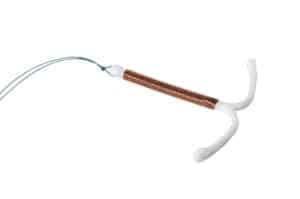IUD Specialist
When choosing a birth control method, some women find they’d prefer a longer lasting alternative to daily birth control pills. Intrauterine devices (IUDs) can be a safe, effective birth control method for women who decide they want a solution that can last at least a few years and is relatively low maintenance. Northwest Women’s Center in Houston, TX offers several types of IUDs and can help patients choose one that best fits their contraceptive needs.
What is an Intrauterine Device (IUD)?
An intrauterine device, commonly called an IUD, is a long-term form of birth control. There are two kinds of IUDs available today: copper and hormonal. The copper IUD and hormonal IUD both stop pregnancy by preventing egg fertilization. The copper IUD, ParaGard, stops egg fertilization because copper repels sperm. Hormonal IUDs, which include Mirena, Kyleena, Skyla, and Liletta, use a steady release of the hormone progestin to stop egg fertilization.
How is an IUD inserted?
IUDs are T-shaped devices that are inserted into the uterus through the cervix (the opening of the uterus) during a simple in-office procedure that takes just a few minutes. The shorter end of the T acts as an anchor to hold the IUD in place. Rarely, an IUD can fall out. The longer end of the T extends into the vaginal canal, and it’s important to check for this tail before having intercourse to ensure the IUD is still in place. During insertion, a speculum is used to widen the vaginal canal so the cervix can be accessed. There may some mild discomfort or cramping when the IUD is inserted. IUDs use copper to create an environment that’s hostile to sperm. Some IUDs also use hormones. IUDs need to be replaced every few years, and removal can be performed in the office using the same technique.
How long before my IUD becomes effective after it is inserted?
The ParaGard copper IUD prevents pregnancy as soon as it is in place. Hormonal IUDs (Mirena, Kyleena, Liletta, and Skyla) only prevent pregnancy right away IF they are inserted during the first 7 days of your period. If you get a hormonal IUD any other time during your cycle, you’re protected after 7 days. IUDs are one of the most effective options for pregnancy prevention today, at more than 99% effectiveness.
Choosing The Right IUD in Houston
We can help you with this decision, as there five different IUD brands approved by the FDA for use in the United States: ParaGard, Mirena, Kyleena, Liletta, and Skyla. These are divided into two types: copper IUDs (ParaGard), which don’t have hormones; and the hormonal IUDs.
We can walk you through the differences between the brands, such as longevity and size. But the main choice comes down to deciding between hormonal or non-hormonal IUDs.
Why to choose a hormonal IUD
Hormonal IUDs are either going to give you complete amenorrhea (loss of your period) or occasional light bleeding. If you’ve been saddled with heavy, long periods your entire life, the thought of not having a period probably sounds awesome. Some people think it is unsafe to not have a period, but that’s not the case. As with the pill, IUDs simply make your body think it is pregnant, hence no periods.
Different hormonal IUDs have different hormonal dosages, with Mirena and Liletta at the highest levels of levonorgestrel with 52 mcg. With the higher levels, you will probably completely lose your period. Kyleena has 19.5 mcg, and Skyla is the lowest at 13.5 mcg, so your period will become lighter than normal, but you also may have some spotting and irregularity for the first few months after insertion.
Why to choose a non-hormonal IUD
Some women don’t want their periods to change, or they don’t like the idea of using hormones. But all IUDs have low hormone levels compared with the Pill or other long-term birth control options. Plus, the hormone IUDs have what is called a “localized mechanism of action,” meaning they work locally in the uterus, not systemically throughout the body like the pill.
Still, if you don’t want hormones, the copper ParaGard IUD is the choice. If you have heavy periods, this is probably not the way to go, however, as for the first few months, bleeding can be significantly higher after the ParaGard is inserted.

Who is a good candidate for an IUD?
Any woman who wants long-term birth control that doesn’t require any daily, weekly, or monthly maintenance may be a good candidate for an IUD. IUDs usually work best for women who have given birth in the past, but women who don’t have children often elect to get an IUD.

IUD Pain
The way each of us perceives pain is unique. Some people find IUD insertion to be no more uncomfortable than a pap smear, while others (particularly if they have painful periods) can have very strong cramps during insertion.
Part of what makes insertion uncomfortable is the opening of the cervix when it is closed. This can feel like a strong menstrual cramp, so it can help to schedule your insertion when your cervix is naturally open just a bit. This happens twice during your menstrual cycle, and we can help you schedule it.
After insertion, any discomfort should be minimal by the time you are home. If you have any cramping, ibuprofen and a heating pad can help.
You need to remember that insertion may involve some pain, but think about the long-term benefits once your IUD is inserted. These provide 99 percent effective pregnancy prevention for anywhere from 3 to 12 years.
Will I feel the IUD?
The IUD is placed inside the uterus at the very top. Plastic strings are attached to the end and are used to remove the IUD. These run through the cervix and outside into the vagina. The strings are left long enough so they can be tucked up behind the cervix. You won’t feel the IUD in place, and your partners shouldn’t either. If you or your partner can feel anything, you need to come see us at Northwest Women’s Center, as the IUD could have slipped.
Risks of IUDs
IUDs have somewhat of a PR problem, linked to the 1970s IUD called the Dalkon Shield that injured thousands of women, and a class action lawsuits followed. But that was almost 50 years ago!
Today’s IUDs are safe, reliable, and have received thorough testing to gain FDA approval. There are some risks with IUDs, but they are rare.
- Perforation — During insertion, the IUD can be pushed through the wall of the uterus. This is usually discovered and corrected right away.
- Expulsion — IUDs can partially or completely slip out of the uterus. If this happens you can become pregnant. If this happens, it is most likely during the first few months of use, or during your period.
- Infection — There is a rare risk of pelvic inflammatory disease (PID) linked to IUD use. PID is usually sexually transmitted, and your risk is higher if you or your partner have multiple sex partners. Most PID infections develop within the first three weeks of insertion.
How long does an IUD prevent pregnancy?
IUDs can prevent pregnancy for years at a time, making it an extremely easy and convenient method of birth control.
- ParaGard: Works for up to 12 years
- Mirena: Works for up to 6 years
- Kyleena: Works for up to 5 years
- Liletta: Works for up to 3 years
- Skyla: Works for up to 3 years
Pregnancy After Removing an IUD
Removing your IUD if you want to get pregnant is a simple, quick procedure. Once it is removed by your OB-GYN, you are fertile immediately, so you can get pregnant right away.
Are IUDs covered by my health insurance?
The Affordable Care Act required most health plans to cover all forms of birth control. There’s a good chance you can get an IUD for free or at a low cost. Ask us about this. Once we see your health plan, we can give you a definitive answer.
Call our office to learn more about your IUD birth control in Houston, TX!
Schedule a Houston IUD Consult at Northwest Women’s Center!
Contact the knowledgeable and compassionate practitioners of Northwest Women's Center today if you are interested in getting an IUD for your birth control needs. Our practice serves women in Houston and the surrounding areas of Texas. Call 281.444.3440 today to arrange a personalized one-on-one consult. We look forward to speaking with you!
